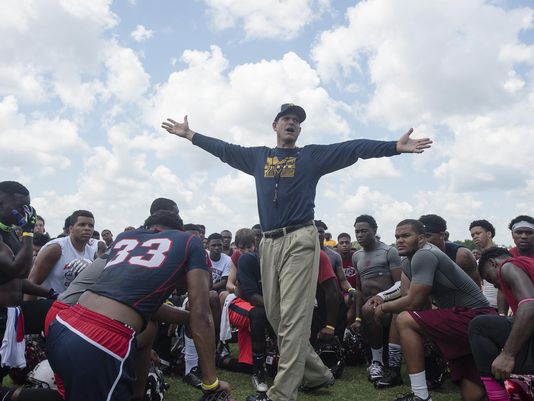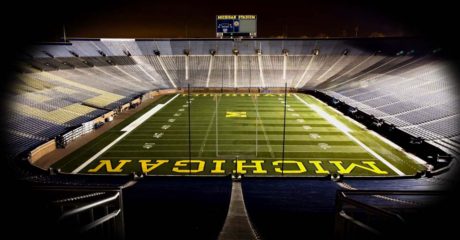Why the NCAA Needed to Rule on Satellite Camps

The first Google image result for the search query “satellite camps.” (image via Montgomery Advertiser)
Late last week the NCAA announced a rules change that prevents FBS programs from holding satellite camps. The idea of satellite camps popped up a couple years ago when Penn State’s James Franklin held one in Georgia, but the idea really took off in 2015 when Jim Harbaugh commenced a nationwide tour of camps from Pennsylvania to Alabama to Florida to Texas to California. Harbaugh became the Henry Ford of satellite camps: he didn’t invent the idea, but he honed it.
Many coaches around the country – particularly in the deep south – spouted off against the notion of holding those camps, just like they did against Michigan holding practices at IMG Academy. The criticisms were a bit varied, but ultimately, they were thinly veiled fears that the Wolverines would infringe on their recruiting territory.
Naturally, Michigan fans have taken offense to the NCAA’s ruling. Fans have a tendency to protect their own, and that has proven to be the case with the response. The general response I have seen is that the NCAA is bowing to the SEC’s wishes, since the SEC brings in a lot of money and has won eight of the last ten national championships.
First, let’s look at some of the pros and cons of unfettered satellite camps:
PROS
- Student-athletes have more opportunities to be seen and noticed by college coaches. In Michigan’s case, several under-the-radar prospects earned scholarship offers in 2015, including Kiante Enis, Antwaine Richardson, Victor Viramontes, and Rashad Weaver, all of whom committed to Michigan.
- Student-athletes have more opportunities to interact with role models. The average player who attends the camps does not sign with an FBS program and will rarely, if ever, get the chance to work with luminary coaches and former players like Jim Harbaugh, Tyrone Wheatley, etc. Like a book signing or autograph booth, this was a chance for Joe Schmoe to see how elite coaches/players approach the game and have a good story to tell someday to their friends/kids or around the water cooler.
- Competition breeds innovation. Like the capitalists we are, competition forces teams to think outside the box and improve their products in order to remain relevant. A boring/lame camp will mean nobody wants to come (the following year, at least), so teams would have to think of how to keep players interested and engaged.
- Football programs increase their reach for recruiting and branding. After some down years at Michigan, satellite camps gave a boost of energy and attention in parts of the country that were difficult to reach beforehand. Michigan has made some inroads in the states of Alabama and Florida, for example, that might have otherwise been more difficult to build.
- Players get to learn the great game of football. Jim Harbaugh has repeatedly talked about the importance of learning the game of football, teamwork, determination, etc., and how those lessons apply to the average person’s life.
- Camps bring coaches closer to the players. Rather than families/student-athletes paying to travel across the country or a couple states away, the cost of some of the travel is translated to programs with multi-million dollar budgets.
CONS
- The American Idol Effect. My problem with American Idol and shows like it has always been that if you were meant to be discovered and famous as a singer, someone probably would have discovered you and made you famous already. In the cases of the players mentioned in the first bullet point above, they signed with Indiana, Maryland, Cal, and Pitt, respectively. Those are okay programs, but they’re not Michigan, Alabama, Ohio State, Oklahoma, USC, etc. Those players were ultimately set up for disappointment and negative attention when they didn’t sign with Michigan, and Michigan didn’t come out of it looking so hot, either. Perhaps Michigan gave them the juice to earn those other scholarships, or maybe Indiana, Maryland, Cal, and Pitt would have come calling, anyway. It’s hard to say.
- Unmitigated interactions with players/families leads to shady dealings. Michigan may not be a “dirty” program – though it’s probably naive to think that some Wolverine somewhere doesn’t cross the line – but bringing college teams and all their various personnel to random cities leads to all kinds of opportunities for inappropriate interactions. Parking lots, diners, under the bleachers, etc., there are oodles of places to meet for $500 handshakes and questionable contact. If a coach or a booster wants to give $500 to a player, he can make it happen on campus or elsewhere. But there are compliance officers, athletic department employees, and spying eyes everywhere when players come to campus. That’s not the case in, say, Prattville, Alabama. The NCAA can’t handle the investigations already in its queue, let alone the additional ones that would invariably pop up with 128 teams holding traveling circuses around the country.
- An overabundance of camps. As a high school coach, I see parents/student-athletes who frequently waste their time and money by traveling to and paying for camps around the country. There are players who aren’t even Division II talent who go to NFL players’ camps, National Underclassman Combines, Division III camps, FBS schools’ camps, etc. Parents take days off work, kids work summer jobs to blow money on their entrance fees, gas gets wasted. Meanwhile, if you’re not attending every camp that travels through town but the kid at your rival high school does, then you risk getting overlooked. Additionally, all these camps could potentially take place on school days or during times when students would previously have relaxed and enjoyed summers with their families. And while I realize this borders on the SEC’s take on spring break practice at IMG Academy (“The players need their spring breaks not to play football, but to go get drunk in Florida!”), there is a very real issue with high schoolers getting burned out with the various commitments necessary to play multiple sports, excel in the classroom, and participate in other extracurricular activities for college applications.
- Coaches have lives, too. Maybe this is lowest on the priority list of the cons, because nobody’s worried about the millionaires or hundred-thousandaires who are FBS coaches. But coaching is a high-profile job. Coaches are never off the clock, rarely take vacations, sleep very little, etc. You have to be passionate about the job if you want to keep the job, and the money doesn’t hurt. But even as a high school coach, I never stop working. Whether it’s reading about the game, watching film, recruiting future players, running workouts, going to clinics, keeping an eye on current players, working on fundraisers, etc., it’s not a job you leave at the office. When Michigan ran its satellite camp series last year, the coaches on staff were taken away from their wives and children for almost two weeks. It’s yet another task to add to the job that already consumes coaches 365 days a year. Jim Harbaugh has mentioned before that the only “vacation” he takes each year is to go on a mission trip to Peru each summer. To “keep up with Joneses” coaches would have to set up satellite camps in other parts of the country, taking them away from those families and adding to their work hours. Again, nobody’s going to feel sorry for a guy making a million dollars a year, but that doesn’t account for the guy’s wife and kids.
- They favor the big boys. Michigan, Ohio State, Alabama, USC, etc., have the money to set up camps, travel the country, and do these types of things. I don’t know that San Jose State, Old Dominion, UTSA, and Middle Tennessee State, among others, have the budget to do so. If the NCAA is looking for any semblance of parity, allowing teams with big budgets to hold camps all over the country further separates the high-profile teams from the ones on the lower end of the spectrum.
As you can tell, I’m not a huge fan of satellite camps. That’s not to say that they’re evil or don’t have their advantages, but overall, I think the negatives of unfettered camps outweigh the positives. It’s an area that needs to be governed and regulated without the infrastructure to do so. Given the choice between a free-for-all and a complete ban, I lean toward banning the practice.
IMPROVING THE IDEA
There are ways to improve or restrict the idea, though. Perhaps the NCAA should allow schools to hold one satellite camp every year, which would mean a maximum of 128 camps spread across the country in any given calendar year. Maybe the NCAA could allow 64 camps, forcing FBS programs to combine their forces in order to maximize exposure for players and reduce the number of competing camps. Another way to address it would be to allow teams one satellite camp every other year, three camps in a five-year period, etc. An additional option would be to restrict camp dates to be held only between June 20-July 20, when most schools are out of session.
In the meantime, there are ways for players to gain exposure. In fact, it’s much easier to get recruited in 2016 than it was in 1986, 1996, or even 2006. I have seen parents carpet-bomb recruiting sites – including Touch the Banner – with links to their sons’ highlights. Hudl has taken off over the past several years, surpassing Youtube as a useful tool. Parents used to have to pay for certain sites to publish profiles and highlights, but now those things can be done for free. Social media tools and e-mail make it easier to contact coaches and get names out there. Satellite camps would have been more advantageous if Bo Schembechler were flying around the country in 1985, but technology has made the world smaller. Unless and until the NCAA members change their minds about satellite camps, parents and coaches of prospective FBS players should refine their skills with media, social media, and self-promotion.

